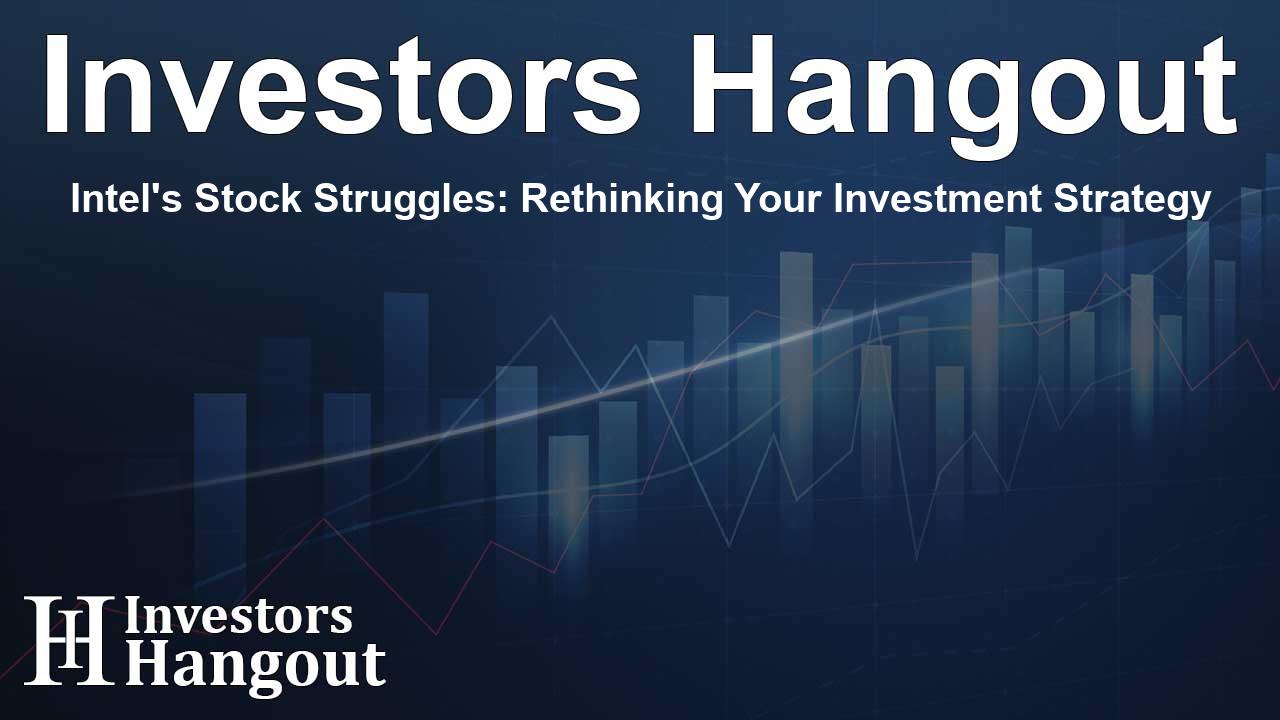Intel's Stock Struggles: Rethinking Your Investment Strategy

Intel's Recent Stock Performance Analysis
Intel Corporation (NASDAQ: INTC) has seen a significant decline in its stock value, down over 55% in the current year. This performance starkly contrasts with the impressive growth of its industry peers, showcasing a difference in effective market strategies and operational efficiencies. The company struggles with profound financial setbacks and operational challenges, necessitating a thorough reevaluation of its current business structure.
Strategic Reassessments at Intel
In response to its ongoing troubles, Intel is exploring multiple strategic options. These include a possible separation of its product design and manufacturing entities. Additionally, the company is identifying factory projects that may need to be curtailed to enhance operational efficiency. By creating Intel Foundry as an independent subsidiary, the company aims to achieve strategic benefits and improve financing with a clearer distinguishing line from its traditional manufacturing and design practices.
AI Innovations and Margin Challenges
Intel is aggressively expanding into artificial intelligence (AI) technology, targeting both edge devices and personal computers with its latest Core Ultra processors. These innovations are set to support an array of software vendors and more than 300 AI models, showcasing Intel's commitment to remain competitive in the rapidly evolving tech landscape. The introduction of the Lunar Lake architecture emphasizes enhancements in graphical performance and AI processing capabilities, promising notable increases in both performance and energy efficiency.
The Gaudi 3 accelerator strengthens Intel's position by offering a comprehensive suite of scalable systems tailored for AI integration across various sectors. This innovative product is designed to facilitate extensive AI training and inference capabilities, positioning Intel as a leader in this revolutionary technology.
However, despite these advancements, Intel's short-term margins have taken a hit. The company's decision to increase the production of AI-focused personal computers in a high-cost facility has impacted profitability. Higher operational costs tied to non-core business activities and unfavorable products further strain margins, compounded by relentless pricing pressure from competitors.
Challenges from the Chinese Market
Intel's revenue is significantly impacted by its operations in China, which represents over 27% of its total income. Recent geopolitical tensions have led to actions aimed at reducing reliance on foreign chip sources, severely affecting Intel's revenue projections. With directives urging a reduction of U.S.-made chips in critical sectors by 2027, this pressure compromises Intel's standing in its largest market.
The U.S. government's restrictions on high-tech exports to China further complicate matters. Consequently, as the consumer and enterprise markets in China experience decreased spending levels, Intel faces a challenging landscape where demand remains weak. Elevated levels of customer inventory are expected to downgrade revenue expectations for the upcoming months.
Revisiting Earnings Estimates and Future Outlook
The adjustment in earnings forecasts for Intel indicates a worrying trajectory. For 2024, earnings estimates have plummeted by 83.9%, now sitting at just 27 cents, while the forecast for 2025 has dropped 41.1% to $1.09. Such downward revisions are indicative of growing investor skepticism regarding Intel's recovery and future performance.
Final Insights on Intel's Investment Potential
Intel's efforts to drive AI adoption through innovative solutions hold potential for revitalizing its position within the semiconductor industry. By tackling scalability, performance, and interoperability challenges, Intel aims to foster broader AI application across global enterprises.
Despite these advancements, the company is facing significant headwinds with its Zacks Rank of #4 (Sell), reflecting a belief that its recent product releases may not sufficiently counterbalance its existing challenges. With ongoing margin issues, strict export regulations, and rising inventory demands, investor confidence may remain shaky. In light of these factors, investing in Intel may warrant cautious consideration.
Frequently Asked Questions
What is the current stock price performance of Intel?
Intel's stock has dropped by over 55% year to date, significantly underperforming its industry counterparts.
What strategies is Intel considering to improve its situation?
Intel is exploring the potential separation of its design and manufacturing sectors and plans to establish Intel Foundry as an independent entity.
How is Intel responding to challenges in the AI market?
Intel is expanding its AI capabilities through new Core Ultra processors and the Gaudi 3 accelerator, aimed at enhancing AI training and inference performance.
What impact do geopolitical tensions have on Intel?
Geopolitical tensions, particularly with China, are causing significant revenue impacts for Intel due to increased competition and regulatory constraints on technology exports.
What are the earnings outlooks for Intel?
Earnings estimates for Intel have seen drastic reductions, indicating broader concerns among investors regarding its recovery potential.
About Investors Hangout
Investors Hangout is a leading online stock forum for financial discussion and learning, offering a wide range of free tools and resources. It draws in traders of all levels, who exchange market knowledge, investigate trading tactics, and keep an eye on industry developments in real time. Featuring financial articles, stock message boards, quotes, charts, company profiles, and live news updates. Through cooperative learning and a wealth of informational resources, it helps users from novices creating their first portfolios to experts honing their techniques. Join Investors Hangout today: https://investorshangout.com/
Disclaimer: The content of this article is solely for general informational purposes only; it does not represent legal, financial, or investment advice. Investors Hangout does not offer financial advice; the author is not a licensed financial advisor. Consult a qualified advisor before making any financial or investment decisions based on this article. The author's interpretation of publicly available data shapes the opinions presented here; as a result, they should not be taken as advice to purchase, sell, or hold any securities mentioned or any other investments. The author does not guarantee the accuracy, completeness, or timeliness of any material, providing it "as is." Information and market conditions may change; past performance is not indicative of future outcomes. If any of the material offered here is inaccurate, please contact us for corrections.